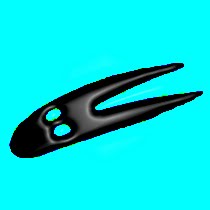Eider
Somateria mollissima
[Linnaeus, 1758]
The eider (duck) is a large, impressive duck, found in numbers around our northern coasts (my father in Fife sees many) and is fabled for its soft feathers which were stuffed into bedding for the luxury "eiderdown" feel...
Every spring the female duck makes a nest, sheds 17 gram of grey, very light down into it and lays 4-5 big eggs.
After its ducklings have hatched, all eiders return back to the ocean.
The down left behind, comes only from female, fully grown, live birds. This makes it always mature and uniform.
Currently, the majority of eiderdown on the world market comes from Iceland where harvesting it is a thousand year old tradition. Only 2.5 t are properly gathered every spring and cleaned by specialized, secret technology which leaves Icelandic eiderdown without contest in quality.
The Eider duck was clearly well known for its soft down feathers and its Greek and Latin name is testament to that....
Somaterion is derived from soma and erion ("body" and "wool" in Greek)
mollissima means "very soft" in Latin (from mollis :soft).
There we have it then.
The Eider is scientifically known as:
"very soft woolly-bodied"

No comments:
Post a Comment